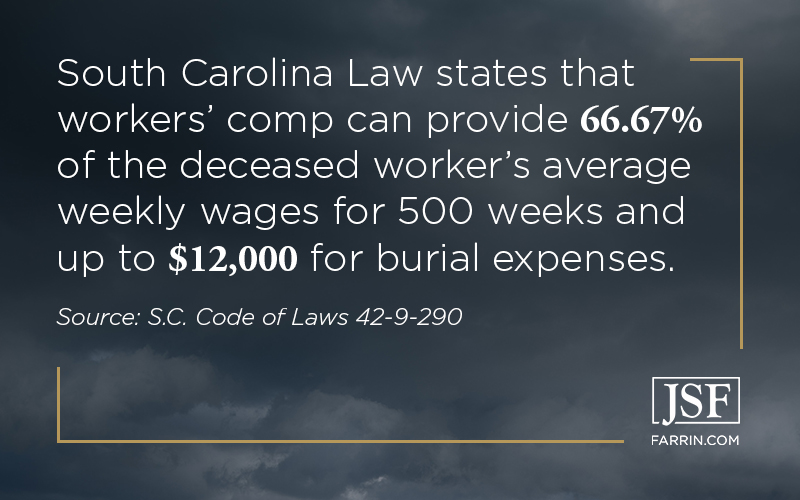
This page refers to Workplace Wrongful Death in South Carolina.
Since laws differ between states, if you are located in North Carolina, please click here.
SC Death Benefits Lawyers Who Know Workers’ Comp Law

According to the South Carolina Occupational Safety and Health Administration (SCOSHA), there were 102 workers killed on the job in South Carolina in 2020. That number may be deceptive – it’s difficult to account for workers who died of diseases they suffered as a result of where they worked, or as a result of a condition aggravated by their work, for example.
Every fatal accident represents a family that must deal with tragedy and loss. It often means the loss of a primary provider, leaving them with bills and funeral expenses on top of their grief. Help may be available, however, in the form of workplace wrongful death benefits under South Carolina law.
We want you to know the facts, and if you have any questions or uncertainty, contact us at 866-900-7078. We’ll do our best to find answers for you.
What Help Does the Law Offer Families of Workers Who Died as a Result of Their Jobs?
South Carolina Law establishes potential benefits for workplace death in Title 42, Workers’ Compensation. Buried in the statute are details regarding the amount and type of benefits, who qualifies as dependents, and how benefits are divided among them.
Here are some of the most common questions asked about workplace death benefits, dependents, and more – explained in simple terms. This isn’t an exhaustive list, and we encourage families and surviving dependents to contact a workers’ compensation attorney with experience in wrongful death cases.
Is There a Date By Which Wrongful Death Claims Must Be Filed in South Carolina?
Yes, there is a statute of limitation in South Carolina outlining when a wrongful death action should be filed. Wrongful death claims must generally be filed within two years of the worker’s passing.
Is There a Timeline for a Worker’s Death to Qualify From a Workplace Injury?
In some cases, a worker’s death after an injury is not immediate. The law recognizes that, even if a worker passes after a time, the death may still be a result of the workplace injury. In these cases, the law requires that the death:
- Proximately results from the accident and within two years of said accident, OR
- Occurs while the worker is on total disability and within six years of said accident
In other words, a worker who dies as a result of a workplace accident more than six years after the accident occurs will likely not qualify for death benefits. Note that specific rules from Title 42-11 cover the contraction of and death from occupational diseases, and the timelines involved with them. These can be extremely complex cases, and we highly recommend consulting a workers’ compensation attorney who is familiar with both occupational disease cases and workplace death cases.
What Benefits Does the Law Provide in a Wrongful Death Claim?
This is covered in section 42-9-290 of the statute. The simplest expression is that the potential benefit can be 66.67% of the worker’s average weekly wages (and not less than $75/week) for 500 weeks from the date of the injury, and up to $12,000 for burial expenses. Benefit divisions between eligible dependents can become complicated, however. See below.
When Does a Workplace Death Benefit Start in South Carolina?
Here is what the statue says, followed by a simpler explanation:
“When weekly payments have been made to an injured employee before his death, the compensation to dependents begins from the date of the last of such payments but does not continue more than five hundred weeks from the date of the injury.”
In simpler terms, if a worker was getting benefits before their death, potential dependent benefits begin where the last payment left off – up to 500 weeks from the injury.
Are There Circumstances When a Death at Work in South Carolina Results in No Benefits?
Yes. According to section 42-9-60, a worker’s death is deemed non-compensable – not eligible for compensation – if the death was the result of either of two things.
- The injury resulting in the worker’s death was caused by the worker’s own intoxication
- It was the worker’s intent to injure or kill his or herself or another
It is important to note that anyone invoking this part of the statute bears the burden of proof. In other words, if an employer or insurer denies workplace death benefits on the basis of section 42-9-60, they must prove that the worker was intoxicated or that the worker intended harm.
Who Receives Workers’ Compensation Death Benefits in South Carolina?
The law provides specific guidance regarding the recipients of possible death benefits for wrongful death accidents. Any benefits are awarded to dependents, who are defined as follows:
- A surviving spouse or minor child is deemed wholly dependent under the statute
- An adult child who is mentally or physically unable to support his or herself
- An adult child less than 23 years old who is enrolled full-time at an accredited educational institution
- Other dependents may be determined by the facts at the time of the injury, but to be determined as dependent, the dependency typically must have existed for at least three months prior to the injury
Additionally, if one or more persons is deemed wholly dependent, they generally receive the whole of the benefits – those who are partially dependent receive none. In the event that more than one person is wholly dependent, any benefit is split evenly between those people.
Section 42-9-140 goes on to define how benefits will be paid when a deceased worker has no dependents, whole or partial. Contact an experienced workers’ compensation attorney if you have questions about death benefits and dependents in your particular wrongful death case.
Can Non-Resident Workers’ Family Members Receive Workplace Death Benefits in South Carolina?
Section 42-9-290 states that eligible aliens not residents of the United States or Canada are compensated just as residents with a few exceptions:
- Dependents in a foreign country are limited to a spouse and surviving child or children
- If no spouse or children are present, a surviving parent whom the worker has supported for at least three years may be entitled to at least a portion of the death benefits
These types of claims can be especially complicated, and some employers or insurers may move to limit payouts in these cases. It is in your best interests to consult with a wrongful death attorney.
If You Have Lost a Loved One Due to a Workplace Accident or Disease, Call Us
The South Carolina workers’ compensation attorneys at the Law Offices of James Scott Farrin are ready to defend the rights of grieving families, and help them seek the maximum workers’ comp death benefits they may be entitled to under the law.
Our law firm cannot bring your loved one back, but we can fight for the benefits that could help you through this tragedy. We negotiate with insurance companies on a daily basis and are here to help you with your wrongful death lawsuit. Call us anytime, 24/7 at 1-866-900-7078 for a free case evaluation.



